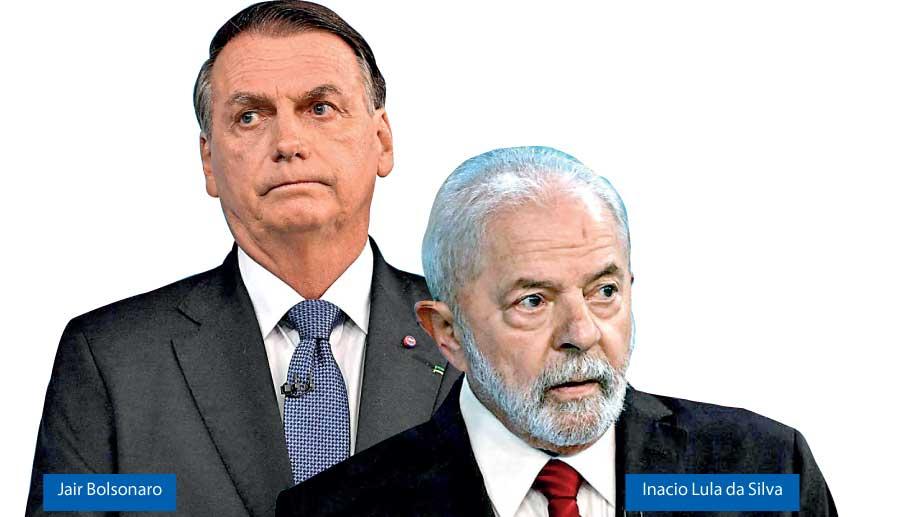20 Jan 2023 - {{hitsCtrl.values.hits}}

 Brazil has no electoral vote problem, and liberal candidate Lula’s win over his right-wing rival is clear-cut. The margin was thin, but Lula got more votes, and no one except Bolsonaro’s supporters believed that the election was rigged Brazil has no electoral vote problem, and liberal candidate Lula’s win over his right-wing rival is clear-cut. The margin was thin, but Lula got more votes, and no one except Bolsonaro’s supporters believed that the election was rigged |
|
|
The storming of Brazil’s presidential palace and supreme court by former president Jair Bolsonaro’s far-right supporters has been described as a coup attempt. Protesters camping outside Brazil’s military headquarters ever since Inacio Lula da Silva won last November’s presidential election have been calling on the army to stage a coup.

Happily, the Brazilian military which has not interfered with the country’s democracy since handing over power to civilian rule in 1988 were not swayed either by Bolsonaro’s supporters or by disinformation regarding Brazil’s elections (the far-right claims that Brazil’s electronic voting system has been manipulated, with no clear evidence).
What incites them is that Lula defeated Bolsonaro by a very narrow margin. But that’s something the defeated must live with. One may recall the results of the US presidential election in 2000, when Democratic Party candidate Al Gore requested a vote recount in Florida, and the supreme court in that state decided against it 5-4.
An appeal could have made the legal quagmire worse, and instead of dragging the US into political turmoil, Al Gore gracefully conceded defeat to avoid electoral chaos.
That made Republican George W. Bush president by one electoral vote. It turned out that though Bush won Florida, Gore had more votes overall in the US (rather like Donald’s Trump’s win over Hilary Clinton). But it’s that one electoral vote which counted.
Brazil has no electoral vote problem, and liberal candidate Lula’s win over his right-wing rival is clear-cut. The margin was thin, but Lula got more votes, and no one except Bolsonaro’s supporters believed that the election was rigged.
Even Bolsonaro didn’t take to the streets crying foul. He also denies inciting his supporters to do a ‘Donald Trump’ in the Brazilian capital. Hospitalised in the US when his supporters stormed key state buildings and wrecked them, he was quick to distance himself from the mayhem, perhaps conscious of the corruption investigations that he and his family will have to face in the near future.
|
|
Key Bolsonaro supporters such as truckers have been blockading highways and trying to wreck the economy after Lula won the elections.
Everywhere, democracy is under attack. When the US, the most powerful and influential democracy in the world, comes under insidious and overt attack from within, repercussions are felt everywhere. Trump’s legacy is to undermine democracy everywhere, not just in the US, and Brazil is but the latest and most brazen example.
Though Trump is out of power, his influence is all-pervasive, and his men are working hard at disseminating disinformation that can go a long way to destabilize a liberal or left-wing democratic government. As Steve Bannon, former Trump White House chief strategist put it: “Look at the great patriots in Brazil, that, at great danger to themselves, have come forward in the streets of Brazil…this is the people saying, no, you didn’t follow the constitution.”
This is a blatant falsehood but very damaging to fragile democracies. The US once castigated the former USSR as the greatest danger to democracy. Now it’s China’s turn. But it looks as if the American far right is now overtly playing that role, using the very democratic freedoms that Trump and his pals are doing their best to undermine. This can rank along with Russia’s invasion of Ukraine and China’s sabre-rattling over Taiwan as a key threat to democracy and peace worldwide.
Brazil’s democracy is saved for the moment mainly because the military remained neutral. But it’s a sobering reminder that modern democracies are also dependent on their militaries, to varying degrees, when it comes to governing. India has managed to keep its army out of politics. The US military too has no taste for politics. But smaller countries such as Sri Lanka face greater challenges because far-right, extremist politicians have calculatingly involved the military in governance.
The best news here in recent times is last week’s announcement that our army strength will be reduced by roughly one-third within a year. Whether this was said simply to appease international donors, or President Wickremesinghe and his backers have the desire, political will and nerve to do this remain to be seen. What is clear is that this is the most obvious way to cut government expenditure, and taxing people to high heaven without doing it leaves us without options for a way out of this mess.
But you can’t force 65,000 or so soldiers and officers, used to the idea of lifetime employment and enjoying one of the highest government salary scales in the country and other benefits, to quit. This isn’t a conscript army, they are all volunteers. Ninety-nine per cent of them aren’t trained to do anything else. Even if they have other skills, it’s hard to find jobs when so many professionals are being laid off.
The government will have to convince international donors to give enough to compensate those who retired from the army. Obviously, this cannot happen in one go and the process may take years. But the country cannot wait years to recover even to 2021 levels.
The money freed from military expenditure has to be spent to give relief to the most needy. But, while coping with hunger and malnutrition is a high priority, welfare is a bottomless pit and as much as possible must be invested in vital sectors such as health and education. If we keep falling behind, we’ll never catch up.
I sincerely hope for the future of the nation that our politicians can overcome habitual personal agendas and narrow political-business interests, and the money freed from the bloated military budget, once available, will not be spent on new highways and other profitable mega projects. One is happening at Eliot Place, Colombo 08, on the site of a demolished former Food Department bakery.
This bakery existed since British times and employed hundreds of workers. It was scrapped and the lucrative bare land was taken over for a 400 luxury housing project for government bigwigs and their well-off friends. Starting during Yahapalanaya, it was contracted to a Chinese company. Construction halted during the pandemic. When Gotabhaya Rajapaksa became president, it became one of his pet projects and was contracted to a Lankan company run by a former arms dealer.
Work ground to a halt last year thanks to Gotabhaya’s own follies. But there is talk now that it will resume in a few months. As the government is the paymaster, where will the money come from? This is not the time to build super luxury flats for big wigs. Many are willing to pay over the agreed to price to have an apartment, but remember that people are starving.
09 Jan 2025 51 minute ago
09 Jan 2025 2 hours ago
09 Jan 2025 3 hours ago
09 Jan 2025 3 hours ago
09 Jan 2025 3 hours ago